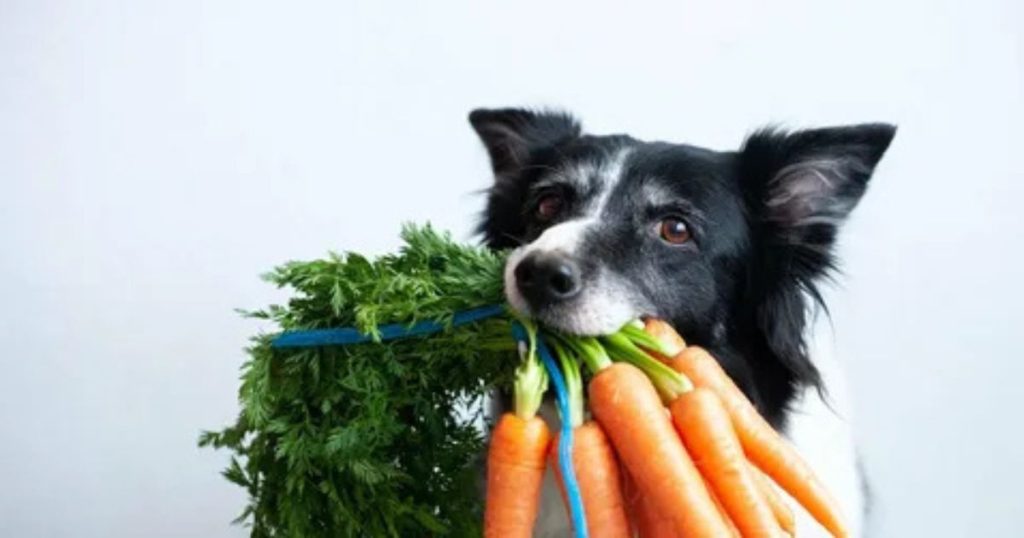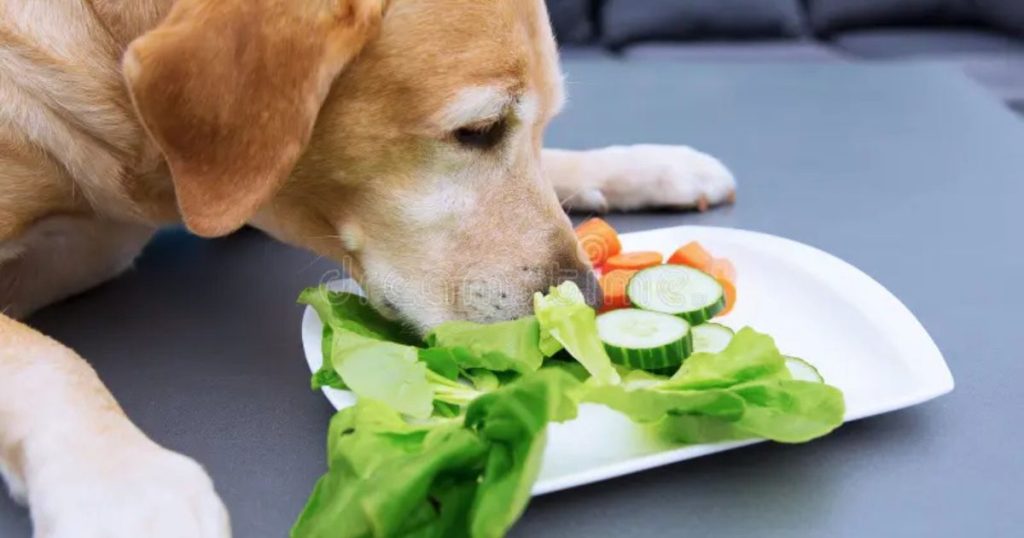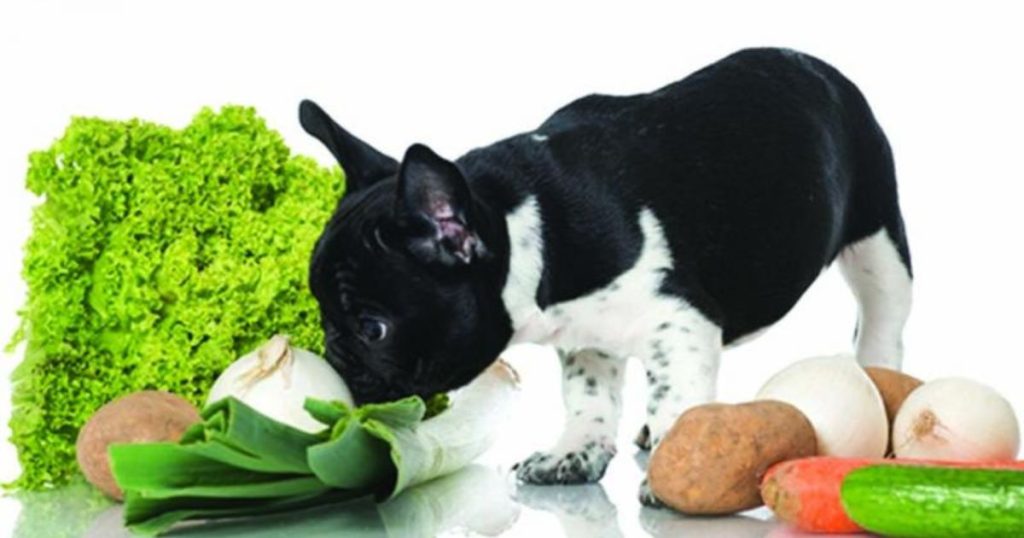As responsible dog owners, we always strive to provide our furry friends with a well-balanced diet that supports their health and well-being. While commercial dog food meets most of their nutritional needs, you might wonder if it’s okay to supplement their meals with vegetables. Vegetables are an excellent source of vitamins, minerals, fiber, and antioxidants that can contribute to your dog’s overall health. However, not all vegetables are safe for dogs. Some can be toxic, while others may cause digestive issues. In this blog post, we’ll provide a comprehensive list of safe vegetables for dogs to eat and explain the health benefits of each. We’ll also highlight some vegetables you should avoid and offer tips on introducing them into your can dogs eat broccoli dog’s diet.
Why Vegetables Are Beneficial for Dogs
Vegetables offer numerous health benefits for dogs when included in their diet. Rich in essential vitamins, minerals, and fiber, vegetables can help support a dog’s immune system, promote healthy digestion, and maintain a shiny coat. Carrots, sweet What Vegetables Can Dogs Eat, potatoes, spinach, and other vegetables are excellent antioxidants that can fight inflammation and support overall can dogs eat carrots wellness.
High-fiber vegetables, such as peas and green beans, aid digestion and help manage weight by keeping dogs feeling full. Additionally, many vegetables are low in calories, making them an ideal treat for overweight dogs or those on special diets. However, it’s important to introduce vegetables gradually and avoid toxic ones like onions, garlic, or mushrooms. Always consult a veterinarian before adding new foods to your dog’s diet. When used appropriately, vegetables are a great, natural can dogs eat tuna way to boost your dog’s health and can dogs eat lettuce well-being.
- Nutrient Boost: Many vegetables are rich in essential vitamins, including K (for healthy bones), C (for immunity), and A (for healthy eyes). They also provide important minerals like potassium, calcium, and magnesium.
- Digestive Health: Vegetables are high in fiber, which can help with digestion, promote regular bowel movements, and prevent constipation. Fiber also supports a healthy gut microbiome, crucial for overall well-being.
- Hydration: Vegetables like cucumbers and zucchini are high in water content, which can help keep your dog hydrated, especially on hot days.
- Weight Management: Dogs who need to maintain or reduce their weight might benefit greatly from the low-calorie content of many vegetables. They also provide bulk, which can help your dog feel full without overindulging.
- However, not all vegetables are suitable for dogs. Some can cause gastrointestinal distress, while others can be toxic. It’s crucial to choose safe vegetables and feed them in moderation.
Safe Vegetables for Dogs

Safe vegetables for dogs provide a nutritious and healthy addition to their diet. Many vegetables are packed with vitamins, fiber, and minerals, making them a great snack. Some of the safest vegetables for dogs include carrots, which are rich in beta-carotene and good for eye health, and veggies good for dogs green beans, which offer low calories and are high in fiber. Sweet potatoes are another excellent choice, providing vitamins and antioxidants. Other dog-friendly vegetables include cucumber, What Vegetables Can Dogs Eat hydrating and low in calories, and peas, which are a good source of protein. Zucchini is also safe, offering vitamins A and C while being fat-free.
Always wash vegetables well and remove any potentially dangerous seeds or skin before adding them to your dog’s diet. While vegetables can offer health benefits, they should be fed in moderation and as part of Vitamins K and C, which support bone and immune health; Vitamins K and C, which support bone and immune health, are also abundant in cucumbers. Vitamins K and C, which support bone and immune health, are also abundant in cucumbers. Re-packed with beneficial nutrients.
They are a great source of beta-carotene, converted into vitamin A in the body. Vitamin A supports healthy vision, immune function, and skin health. Carrots are also low in calories and high in fiber, which can aid in digestion and help maintain a healthy weight. They can be served raw as a crunchy treat or cooked to make them Can Dogs Eat Apples easier to digest. Just chop them into bite-sized pieces to avoid choking, especially for smaller dogs.
Sweet Potatoes
Sweet potatoes are a highly nutritious vegetable for dogs. They are an excellent source of dietary fiber, which helps regulate digestion and prevent constipation. Additionally, sweet potatoes are rich in vitamin A, which promotes skin, coat, and eye health. They are rich in antioxidants, which help combat inflammation and promote overall health. Cooked sweet potatoes (baked, boiled, or mashed) are easy for dogs to digest, but be sure Because they can be. The skin should be removed because it is difficult for What Vegetables Can Dogs Eat dogs to should dogs eat vegetables chew.
Green Beans
Green beans are a low-calorie vegetable rich in fiber, making them an ideal snack for dogs, particularly those who need to lose weight. They are also a great source of vitamins and minerals, including vitamins K, C, and manganese. Green beans can be served raw or steamed, but avoid canned green beans that may contain added sodium or preservatives. For smaller dogs, cut the beans into smaller pieces to prevent choking.
Broccoli
Broccoli is a nutrient-dense vegetable packed with vitamin C, fiber, and antioxidants. It supports a healthy immune system, helps reduce inflammation, and improves digestion. Broccoli also contains sulforaphane, a compound shown to have cancer-fighting properties. Although broccoli is generally safe for dogs, it should be fed in moderation. Too much broccoli can cause gastrointestinal upset, including bloating and gas. To gauge your dog’s reaction, start with tiny portions.
Spinach
Spinach is another leafy green vegetable rich in vitamins (A, C, and K), iron, and magnesium. It also contains antioxidants, which help boost the immune system and protect against oxidative stress.However, if taken in excess, spinach includes oxalates, substances that can cause renal problems and interfere with calcium absorption. Therefore, spinach should be offered in moderation. You can steam it to reduce the oxalate content and make it easier for your dog to digest. What Vegetables Can Dogs Eat?
Cucumbers
Cucumbers are an excellent low-calorie dog treat, especially in the summer months. They are composed mostly of water, which helps keep your dog hydrated. Vitamins K and C, which support bone and immune health, are also abundant in cucumbers. Although cucumbers are normally acceptable to serve uncooked, they should be seeded and chopped into small pieces to avoid swallowing, especially for smaller dogs.
Peas
Peas are abundant in vitamins, fiber, and plant-based protein. They provide vitamins A, K, and B and important minerals like manganese and iron. Peas are also rich in antioxidants, which help protect against cell damage and inflammation. Frozen peas are an easy and affordable option. They can be thawed or lightly steamed before serving. Be sure to avoid canned peas with added salt or preservatives.
Zucchini
Zucchini is another low-calorie vegetable with a high water content, making it a great hydrating dog snack. Additionally, it offers a good amount of vitamins A, C, and K and fiber to support digestion. Zucchini is easy to digest and can be served raw or cooked. If feeding it raw, cut it into small pieces to avoid choking. This versatile vegetable can be given to your dog as a treat or included in their normal meals.
Brussels Sprouts
Brussels sprouts are a great source of fiber, vitamins C and K, and antioxidants. They also promote healthy digestion, immune function, and bone health. However, Brussels sprouts can cause gas and bloating in some dogs, so feeding them in moderation is important. You can steam or roast them to make them more digestible, but avoid adding seasoning or butter.
Asparagus
Asparagus is low in calories and high in vitamins A, C, and K, as well as folate and fiber. It can help support a healthy digestive system and immune function. Asparagus can be fed raw or cooked, but it’s important to cut it into small, manageable pieces to avoid choking. Some dogs may find the taste of asparagus to be acquired, so keep going if your dog takes to it immediately.
Pumpkin
Pumpkin is a well-known vegetable that offers numerous health benefits for dogs. It is a great source of fiber, which helps with digestive health and can alleviate both constipation and diarrhea. Pumpkin is a nutritious addition to your dog’s diet because it contains antioxidants and vitamins A and C. You can feed your dog canned pumpkin (without added sugar or spices) or fresh pumpkin that has been cooked and pureed. Avoid giving your dog raw pumpkin, as it can be tough on their digestive system.
Vegetables to Avoid

While nutritious for most, some individuals may best avoid certain vegetables due to their potential negative health effects. Nightshades, including tomatoes, potatoes, and eggplants, contain solanine, which can trigger joint pain and inflammation in sensitive individuals. Cruciferous vegetables like broccoli, cauliflower, and cabbage may interfere with thyroid function, particularly for those with pre-existing thyroid conditions, due to their goitrogenic properties. Legumes such as lentils and beans can cause digestive problems such as gas and bloating, particularly for sensitive can dogs have cauliflower stomachs.
Mushrooms, though packed with nutrients, may be difficult for some to digest and can cause allergic reactions. Spinach and Swiss chard contain oxalates, which may cause kidney stones to form in people who are already at risk. Additionally, corn is high in carbohydrates, potentially leading to blood sugar spikes for those managing diabetes. As with any diet, moderation and individual tolerance should guide vegetables for dogs vegetable choices.
How to Safely Introduce Vegetables to Your Dog’s Diet
Introducing vegetables to your dog’s diet can provide essential nutrients and promote overall health, but it’s important to do so safely. Start by selecting dog-safe vegetables such as carrots, green beans, sweet potatoes, and zucchini. Avoid toxic vegetables like onions, garlic, and certain mushrooms. Begin with small portions, and observe how your dog reacts to each new vegetable. This helps prevent digestive upset or allergic reactions. To make veggies simpler to digest, cook them gently and refrain from adding spices, butter, or salt.
Introduce one vegetable at a time to monitor for any adverse effects. Be mindful of the quantity—vegetables should only make up 10% to 20% of your dog’s diet. Before making big changes, always get advice from your veterinarian, particularly if your dog has underlying medical issues. Gradually incorporating vegetables as treats or meal add-ins can support your dog’s well-being while ensuring can dogs have broccoli their digestive system stays balanced.
- Start with Small Portions: Introduce one vegetable at a time and feed it in small quantities to see how your dog reacts. Keep an eye out for any symptoms of gastrointestinal distress, such as vomiting or diarrhea.
- Cook or Steam: Cooking or steaming vegetables can make them easier for your dog to digest. Avoid adding spices, butter, or seasonings, as these can harm dogs.
- Chop Into Small Pieces: Cut veggies into bite-sized pieces for smaller dogs to lower the chance of choking.
- Watch for Digestive Issues: If your dog experiences discomfort after eating a new vegetable, discontinue feeding it and consult your vet.
How to Prepare Vegetables for Your Dog
Preparing vegetables for your dog is a great way to provide additional nutrients and variety. First, choose dog-safe vegetables such as carrots, sweet potatoes, peas, green beans, and spinach. Avoid toxic vegetables like onions, garlic, and certain mushrooms. Wash all veggies thoroughly to remove dirt and pesticides. For tough veggies like sweet potatoes and carrots, it’s best to steam or boil them until soft, which makes them easier to digest. Cut them into small, bite-sized pieces to prevent is cauliflower good for dogs Can Dogs Eat Apples? A Comprehensive Guide For Dog choking.
You can also mash or puree certain vegetables, like peas or squash, for easier consumption. Always introduce new vegetables gradually to avoid upsetting your dog’s stomach. Some dogs may have preferences, so try different types and observe their reactions. Serve vegetables as a snack or mix them into their regular meals. Make sure your dog’s diet meets their health requirements by speaking with your veterinarian before making any major dietary changes.
Why Should Dogs Eat Vegetables?

Dogs can benefit from eating vegetables as part of a balanced diet. While primarily carnivores, dogs can digest certain vegetables and receive essential nutrients that promote health. Vegetables like carrots, spinach, and sweet potatoes provide important vitamins (such as vitamins A and C), minerals (like potassium and fiber), and antioxidants that support a healthy immune system, improve digestion, and contribute to overall wellness.
Including vegetables in your dog’s diet can also help manage weight by offering low-calorie, high-fiber options, promoting satiety without overfeeding. Vegetables veggies good for dogs can improve skin and coat health and reduce inflammation, benefiting dogs with allergies or joint issues. However, impochoosing dog-safe vegetables and cooking them appropriately is important for potential digestive issues. Always consult a veterinarian before introducing new foods to ensure the right balance for your dog’s nutritional needs.
Conclusion:
Adding vegetables to your dog’s diet can be both delicious and healthful. Offering They offer a variety of essential nutrients and fiber that can support overall health. From carrots and sweet potatoes to broccoli and zucchini, a wide range of safe vegetables can provide both nutritional benefits and a satisfying crunch. As with any food, it’s important to feed vegetables in moderation and to prepare them properly.
If you need clarification on whether a particular vegetable is safe for your dog, consult your veterinarian. By making informed choices, you can provide your dog with a well-rounded, nutritious diet that includes a variety of healthy vegetables, helping it live a long, happy life.
FAQ:
How should Vegetables be Prepared for Dogs?
Vegetables should be washed thoroughly and cooked (if necessary) to remove harmful substances. Steaming or boiling is often the best way to prepare vegetables for dogs. Avoid using oils, spices, or seasonings, as they can be harmful.
Can Dogs Eat Raw Vegetables?
Many dogs can eat raw vegetables like carrots, cucumber, or celery. However, some vegetables, like sweet potatoes, are best served cooked to make them easier to digest.
How Many Vegetables Should I Give My dog?
Vegetables should only comprise about 10% of your dog’s diet. Start with small portions to see how your dog reacts, and avoid overfeeding.
Are There any Benefits to Giving my dog Vegetables?
Yes! Vegetables provide essential vitamins, minerals, and antioxidants to help with digestion, weight management, and overall health. They can also serve as a low-calorie treat option for dogs.
